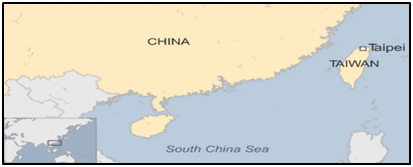Why in news?
- On January 13, Taiwan will vote to elect its next President and legislature.
- With Taiwan's complicated ties to China and rising global tensions, the election result could be a big deal for the island.
- China, despite never ruling Taiwan, insists it's theirs and has not ruled out using force to claim it, home to 24 million people.
What’s in today’s article?
- China – Taiwan Relation
- News Summary
Geographical location of Taiwan:

- Taiwan is located north of the Philippines and the South China Sea.
- It is about 180 km off the south-eastern coast of China.
- It is separated from the mainland by the Taiwan Strait.
China – Taiwan Dispute
- Background
- The island seems to have first appeared in Chinese records in AD239, when an emperor sent an expeditionary force to explore the area.
- This evidence is used by Beijing to back its territorial claim.
- After a relatively brief spell as a Dutch colony (1624-1661), Taiwan was administered by China's Qing dynasty from 1683 to 1895.
- In 1895, Japan won the First Sino-Japanese War, and the Qing government had to cede Taiwan to Japan.
- After World War Two, Japan surrendered and relinquished control of territory.
- Civil War
- When Japan surrendered, The Chinese Nationalist Party (also known as the Kuomintang, KMT) began ruling Taiwan with the consent of its allies, the US and UK.
- Chiang Kai-shek was the ruler of this party.
- However, almost immediately following Japan’s surrender, the Chinese Civil War broke out between the KMT and the Chinese Communist Party (CPC).
- Chiang and the remnants of his Kuomintang government fled to Taiwan in1949.
- Disagreement and confusion about Taiwan
- China regards Taiwan as a breakaway province which it has vowed to retake, by force if necessary.
- China has repeatedly insisted that Taiwan should be called Chinese Taipei, in efforts to prevent international recognition of Taiwan as a country.
- But Taiwan's leaders argue that it is a sovereign state. Taiwan continues to participate in international events and dialogues separately.
- It has its own constitution, democratically-elected leaders, and about 300,000 active troops in its armed forces.
Who recognises Taiwan?
- Initially, Chiang Kai-shek's Republic of China (ROC) government held China's seat on the United Nations Security Council.
- In the Cold War, the Taiwanese government in Taipei emerged as a crucial ally of the United States and took over China’s seat on the UN Security Council.
- However, all that changed in 1979 when the US, as part of its efforts to normalise ties with mainland China, moved its recognition from Taipei to Beijing.
- Officially, the US recognises Beijing’s belief that Taiwan is a part of China under the ‘one China’ theory.
- However, it maintains close connections with Taiwan.
- Since then, the number of countries that recognise the ROC government diplomatically has fallen drastically to about 15.
India-Taiwan relations
- India does not have formal diplomatic ties with Taiwan. Like most countries, it maintains commercial ties with Taiwan.
- In 1995, New Delhi set up the India-Taipei Association (ITA) in Taipei to promote interactions between the two sides.
- The aim of ITA was to facilitate business, tourism, and cultural exchanges.
- ITA has also been authorized to provide all consular and passport services.
- In the same year, Taiwan too established the Taipei Economic and Cultural Centre in Delhi.
News Summary: China – Taiwan Relation
Taiwan’s transition to democracy
- From 1949 to 1996, Kai-shek’s KMT ruled Taiwan under a de facto dictatorship but in 1996, the country held its first direct presidential election.
- Since then, it has undergone three peaceful transfers of power in 2000, 2008, and 2016.
- Taiwan’s current President, Tsai Ing-wen, made history in 2016 by becoming the first woman to be elected to the top office.
- She is constitutionally barred from running again.
China – Taiwan Relation: Current Status
- Commercial ties
- Despite the tensions, China is Taiwan’s largest commercial partner. A large number of Taiwanese have familial and commercial ties across the strait.
- Concerns of Beijing remain
- Beijing remained concerned by different demographic factors.
- Over 60% of the island’s population now identifies exclusively as Taiwanese, with 30% identifying as both Taiwanese and Chinese, and only 2.5 % as Chinese.
- For the first time ever, all of the presidential contenders are native Taiwanese, which means their ancestors immigrated to the island nation prior to the Chinese Civil War.










